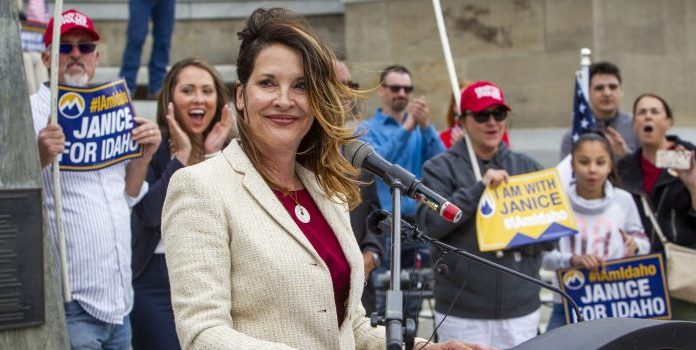UPDATE 5/28/21 2:30 EDT: Idaho Gov. Brad Little, a moderate, on Friday issued an executive order repealing a 24-hour-old mask-mandate prohibition put in place while he was out of the state by the lieutenant governor, describing her actions as a tyrannical abuse of power and an “irresponsible, self-serving political stunt.”
The Republican governor up to now had been reserved in his comments about conservative Republican Lt. Gov. Janice McGeachin, who has worked to undermine Little’s handling of the coronavirus pandemic.
McGeachin last week announced her run for governor, challenging the first-term incumbent Little.
Her executive order Thursday banning mask mandates in schools and public buildings is widely seen as part of that campaign. And she is already using her nullified executive order in fundraising efforts.
ORIGINAL ARTICLE: (Headline USA) With the governor out of the state, Idaho’s lieutenant governor issued an executive order Thursday banning mask mandates in schools and public buildings, saying the face-covering directives threatened people’s freedom.
Republican Lt. Gov. Janice McGeachin is acting governor while moderate Gov. Brad Little is at the Republican Governors Association conference in Nashville, Tennessee. He was expected to return Thursday evening.
Last week, McGeachin announced her run for governor, challenging the first-term incumbent Little. McGeachin is to the right of Little ideologically in the conservative state, and her order could bolster her support as a candidate for governor.
Little’s office said McGeachin did not make him aware that she planned to issue the executive order. The office didn’t say what Little would do when he returned, but it did say residents value local control.
“Throughout the pandemic, Governor Little has been committed to protecting the health and safety of the people of Idaho and has emphasized the importance of Idahoans choosing to protect our neighbors and loved ones and keeping our economy and schools open,” Little’s spokeswoman, Marissa Morrison, said.
Little has never issued a statewide mask mandate, but some counties, cities and schools have done so. Many have been lifting the mandates as more residents are vaccinated against COVID-19.
The executive order was signed by Republican Secretary or State Lawerence Denney and went into effect at 11 a.m. Denney’s office said it confirmed Little was out of state before determining the order was valid under the Idaho Constitution.
The order applies to city and county governments, public universities, colleges and schools, and public libraries. The ban does not apply to federal buildings, hospitals or healthcare facilities.
Courts are not specifically mentioned in the two-page order, and it’s not clear how the executive order would effect that branch of government.
“I’ve been listening to people all across the state with the concern about, especially, why are little kids being forced to wear masks in school,” McGeachin said during an interview by the Associated Press. “My oath to the Constitution is to protect those rights and freedoms of the individual, and I’ve never supported any type of a mandate on the individual, especially when it comes to health care choices.”
She said she hoped Little would let the order stand when he returned.
About 590,000 of Idaho’s 1.8 million residents have been vaccinated. State officials have reported that the virus has killed more than 2,000 people in the state and sickened some 190,000.
McGeachin said she hasn’t been vaccinated and didn’t plan to do so. She believes she had COVID-19 last year and has a natural immunity now. She said the experience for her was similar to the flu.
“I have concerns about the long-term, prolonged wearing of the mask, what it may do to our lungs,” she said, noting it was her personal belief. “If it’s something that the individual feels like they need to do to protect themselves than I support that.”
McGeachin noted that the Republican-dominated state House of Representatives overwhelmingly passed a mask-mandate ban earlier this year, but the bill died in the Senate when a powerful committee chairman, Republican Sen. Fred Martin, declined to give it a hearing.
Adapted from reporting by Associated Press.

